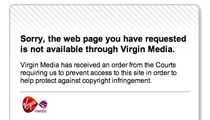This website uses cookies so that we can provide you with the best user experience possible. Cookie information is stored in your browser and performs functions such as recognising you when you return to our website and helping our team to understand which sections of the website you find most interesting and useful.
Business News Digital Labels & Publishers Legal Top Stories
More web-blocks in Europe: Portugal and Ukraine join the party
By Chris Cooke | Published on Tuesday 27 October 2015

More fun times for fans of web-blocking now. Over 50 websites have been blocked by internet service providers in Portugal as a result of a voluntary agreement reached between government, the entertainment industry and the net sector’s trade body.
As previously reported, web-blocks are being used in an increasing number of countries in a bid to counter piracy. ISPs are ordered to stop their users from accessing websites deemed by one authority or another to be rampant copyright infringers. The blocks are usually instigated by a court injunction, either as a result of new web-blocking laws or, as in the UK, simply by a specific interpretation of existing copyright rules.
Though in Portugal, where The Pirate Bay was blocked earlier this year, a special process has now been formalised by the country’s Ministry Of Culture and the Association Of Telecommunication Operators, in liaison with reps for the content industries, that will seemingly make web-blocking there even easier.
According to Torrentfreak, over 50 sites were blocked this weekend as a result of the new initiative, including the usual suspects like KickassTorrents and ExtraTorrent. But that’s just the start of it, with hundreds of sites now likely to be blocked in the country, meaning Portugal could soon have more sites blocked than the UK, which has been particularly prolific in the web-blocking domain to date.
Meanwhile, moves are afoot in Ukraine to introduce web-block laws and nice big heavy fines for companies who do not comply with anti-piracy efforts. The new legislation being considered in the country is almost certainly a response to international pressure, especially from the US, to do more to crackdown on copyright infringement, with several piracy ventures – including the aforementioned ExtraTorrent – having bases in Ukraine.
Of course web-blocks are only partly effective, because it’s relatively easy to circumvent the blockades, though rights owners still see them as a key tool in trying to persuade web-users to use legit rather than copyright infringing content platforms online.





